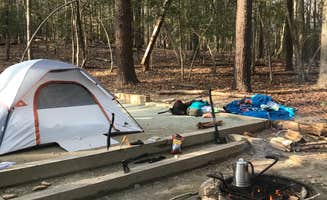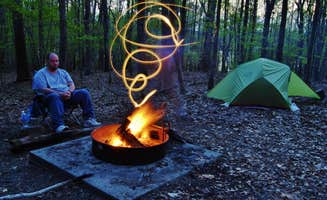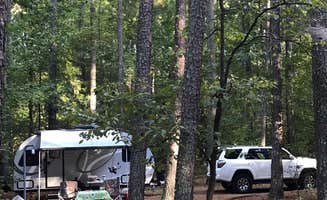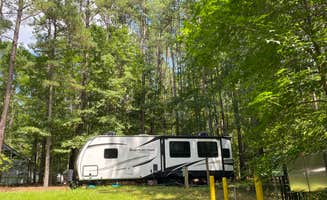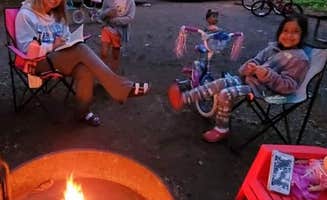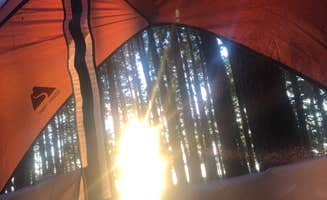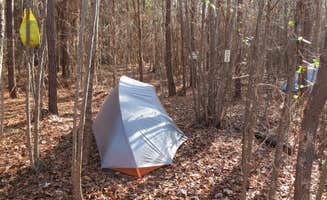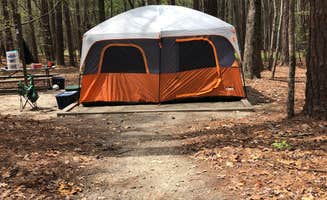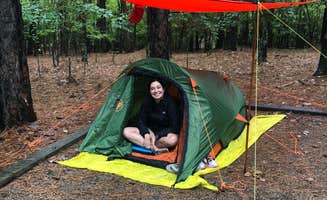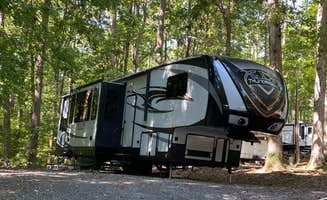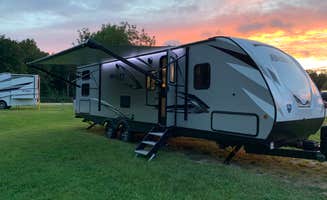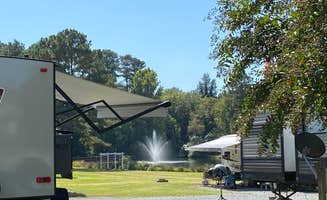Chapel Hill camping options extend beyond the state recreation areas, with primitive backcountry sites available at sites like Eno River State Park. The region experiences mild winters with occasional freezing temperatures and hot, humid summers that typically reach 90°F. Most campgrounds remain accessible year-round, though primitive areas may close during winter months.
What to do
Kayaking access: At Parkers Creek Campground, campers can enjoy easy water entry for small watercraft. "Quite lake with few powerboats so my partner could enjoy it with our dog in a blowup kayak," notes Joe Y., who appreciated the lower motorboat traffic compared to other sections of Jordan Lake.
Hiking trails: William B. Umstead State Park offers extensive trail networks suitable for both casual walkers and serious hikers. "There are a wide variety of single track to larger sand/dirt paths. My cross country team will come here for long runs," shares Sarah M., highlighting the diverse trail options within the park boundaries.
Wildlife observation: Many campsites in the region provide opportunities to view local fauna. At Jordan Lake, one camper mentioned, "Deer walked right behind our site," demonstrating how wildlife frequently approaches camping areas, particularly during morning and evening hours.
What campers like
Spacious sites: Poplar Point Campground receives consistent praise for its well-designed layout. "We camped at C-52. This site was very spacious, easy to back into, and level. This was a HUGE site, lots of space between neighbors," notes Martha S., emphasizing the generous spacing that many campgrounds in the region feature.
Lake swimming: Multiple campgrounds provide swimming access beyond designated beaches. "Been here twice this summer with friends. Loved being able to just chill in the lake away from it all," shares Joanna R. about Poplar Point, describing informal swimming spots that supplement official beach areas.
Clean facilities: Maintenance standards across the region tend to be high. At Holly Point, "Bathhouses were super clean. And we were a short walk to the lake to fish and hang out near the water," according to Melinda J., reflecting the state parks department's attention to facility maintenance.
What you should know
Gate closing times: Some campgrounds restrict after-hours access. "They lock the gate after a certain hour. If you need something or arrive after hours you are out of luck," cautions Debbie F. about Crosswinds Campground, suggesting campers plan arrivals accordingly.
Alcohol policies: State parks officially prohibit alcohol but enforcement varies. "Rangers can be very ticket-happy if you bring beer so be aware," warns one Poplar Point camper, indicating more stringent enforcement at certain campgrounds compared to others.
Weather drainage: The region's clay soil affects water runoff at campgrounds. "We had a substantial deluge while there, and the water drained just fine," reported Stuart O. at Poplar Point, though other campgrounds may experience standing water after heavy rains.
Tips for camping with families
Beach proximity: When camping with children, select sites near swimming areas. At Crosswinds Campground, "Loved having a double site with my parents. Close to the beach where we sat for hours," shares Angela M., highlighting the convenience of waterfront access for intergenerational camping.
Educational programs: Several parks offer structured learning activities. At Eno River State Park, campers appreciate "the educational experiences at this park. Very knowledgeable and clean," according to Elizabeth V., referencing ranger-led programs available during peak seasons.
Primitive camping options: For families seeking more solitude, Eno River provides remote sites. "We also backpack into the primitive sites frequently. The primitive sites are spaced far enough apart that it truly feels like solitude," notes Sarah W., specifically recommending "Piper Creek is our favorite. Flat and easy 1.2 mile hike in along the river."
Tips from RVers
Urban accessibility: North Carolina State Fairgrounds offers full-hookup camping minutes from downtown Raleigh. "We needed to stop in Raleigh for the night and stayed here. It's quiet and huge and full hookups for $30/night," reports Jenifer K., noting this budget-friendly option despite its lack of natural amenities.
Internet connectivity: Remote workers find good connectivity at most regional campgrounds. "For those that care about working on laptop or streaming TV while camping, our cellphone hotspots worked great. We got anywhere from 30-55mbps with our Verizon cell coverage," reports Andrew S. about Poplar Point, reflecting the region's strong cellular infrastructure.
Utility arrangements: Many campgrounds provide water and electric but require dump station use. "Each site has water and electric hook-up. Sewer however is a dump station," notes Paul H. about Crosswinds Campground, a setup typical across the region's state park campgrounds.


